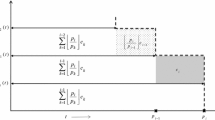Abstract
Earliest Deadline algorithm is today the most attractive real-time scheduling theory. However, should the processor experience a transient overload, Earliest Deadline scheduling can not directly ensure that almost the most important tasks of the application are guaranteed. Schedulability condition should be employed to detect transient overloads before they occur, so that these transient overloads can be handle in an appropriate way. We say that Earliest Deadline scheduling is then unstable. The Regisseur is a real-time scheduling controller which provides the stability property to the Earliest Deadline scheduler by the mean of an importance criterion and by the mean of such schedulability condition. In this paper, we first describe the Regisseur principles and the way it works. Then an example is given to point out its performances.
Similar content being viewed by others
References
Baruah, S., Koren, G., Mishra, B., Raghunatham, A., Rosier, L., and Shasha, D. 1991. On line scheduling in the presence of overload. IEEE Foundations of Computer Science Conference, San Juan, Puerto Rico, 101–110.
Campbell, R. H., Horton, K. H., and Belford, G. G. 1979. Simulations of a fault tolerant Deadline Mechanism. Digest of Papers FTCS-9: 95–101.
Chetto, H. 1990. L'ordonnancement dans les systèmes de contrôle temps réel à contraintes strictes. Thèse de doctorat d'Etat, Université de Nantes, Ecole Nationale Supérieure de Mécanique.
Chung, J. Y., and Liu, J. S. 1988. Algorithms for scheduling periodic jobs to minimize average error. Proc Real-Time Sys. Symp., Huntville, Alabama, USA, pp. 142–151.
Delacroix, J. 1994a. Un contrôleur d'ordonnancement temps réel: le Régisseur, RTS'94 Conference proceedings, Paris, pp. 85–93.
Delacroix, J. 1994b. Stabilité et régisseur d'ordonnancement temps réel. TSI 13(2): 223–250.
Delacroix, J. 1994c. Un contrôleur d'ordonnancement temps réel pour la stabilité de Earliest Deadline en surcharge: le Régisseur, Thèse de l'Université Pierre et Marie Curie.
Delacroix, J., Santellani, C., Métais, O., and Gaultier, O. 1995a. Une plate-forme d'expérimentation pour l'ordonnancement temps réel réparti basée sur le micro-noyau CHORUS. RTS'95 Conference proceedings, Paris, 233–241.
Delacroix, J., and Santellani, C. 1995b. A test bed for distributed real-time scheduling experimentation based on the CHORUS micro-kernel. ERSADS 95 Conference proceedings, l'Alpe d'Huez, 305–310.
Dhall, S. K. 1977. Scheduling Periodic Time Critical Jobs on Single Processor and Multiprocessor Computing Systems, Ph.D., University of Illinois.
Gaultier, O., and Métais, O. 1994. Conception et implantation d'un ordonnanceur à échéance au sein du micronoyau Chorus, Mémoire d'ingénieur en Informatique du Cnam.
Jackson, J. R. 1955. Scheduling a production Line to Mimimize maximum Tardiness. Research Report 43, Management Science Research project, UCLA.
Jensen, E. D., Locke, C. D., and Tokuda, H. 1985. A time-driven scheduling model for real-time operating systems. Proceedings of 1985 IEEE Real-Time Systems Symposium, 112–122.
Koren, G., and Shasha, D. 1995. Dover: An optimal on-line scheduling algorithm for overloaded uniprocessor real-time systems. SIAM J. Comput. 24(2): 318–339.
Leung, Y. T., and Young, G. H. 1990. Minimizing total tardiness on a single machine with precedence constraints. ORSA Journal on Computing 2(4): 346–352.
Liu, C. L., and Layland, J. W. 1973. Scheduling algorithms for multiprogramming in a hard real-time environment. Journal of ACM 20(1): 46–61.
Mcmahon, G., and Florian, M. 1975. On scheduling with ready time and due dates to minimize maximum lateness. Opérations Research 23(3): 475–482.
Marce-Marondo, J. 1993. Un simulateur d'ordonnancement de tâches temps réel: approche orientée objet, langage Ada. Mémoire d'ingénieur en Informatique du Cnam.
Nassor, E., and Bres, G. 1991. Hard real-time sporadic tasks scheduling for fixed priority schedulers. International Workshop on Response Computer Systems (Office of Naval Research/INRIA), Golfe Juan, France.
Paul, C. J., Acharya, A., Black, B., and Strosnider, J. K. 1991. Reducing problem-solving variance to improve predictability. Communication of the ACM 34(8): 81–93.
Payton, D. W., and Bihari, T. E. 1991. Intelligent real-time control of robotics vehicles. Communication of the ACM 34(8): 49–63.
Shin, K. G., and Chang, Y. H. 1989. Load sharing in distributed real-time systems with Stae-change broadcasts. IEEE Transactions on Computers 38(8): 1124–1142.
Sprunt, B., Sha, L., and Lehoczhy, J. P. 1989. Aperiodic task scheduling for hard-real-time systems. The Journal of Real-Time Systems 27–60.
Stankovic, J. A., Ramamritham, K., and Cheng, S. 1985. Evaluation of a flexible task scheduling algorithm for distributed hard real-time systems. IEEE Transactions on Computers C-34(12): 1130–1143.
Stoyenko, A. D., and Georgiadis, L. 1992. On optimal lateness and tardiness scheduling in real-time systems. Computing 47: 215–234.
Author information
Authors and Affiliations
Rights and permissions
About this article
Cite this article
Delacroix, J. Towards a stable Earliest Deadline scheduling algorithm. Real-Time Syst 10, 263–291 (1996). https://doi.org/10.1007/BF00383388
Issue Date:
DOI: https://doi.org/10.1007/BF00383388




